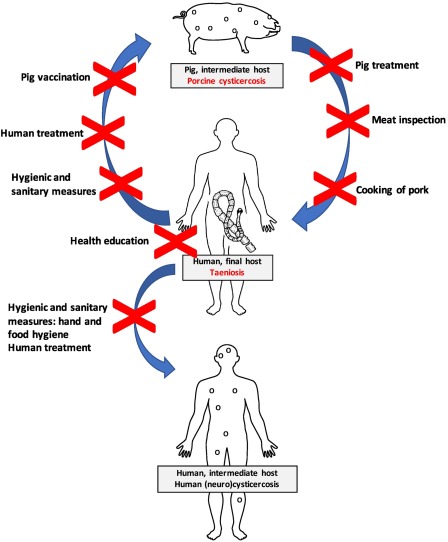
Taeniasis is a parasitic disease of the intestinal tract caused by the adult tapeworm. The infection is endemic to developing countries, but is becoming increasingly common in the U.S., where it is most prevalent among lower socioeconomic groups. Transmission occurs via fecal-oral routes, which can occur through poor hygiene in food service industries. Additionally, infants are commonly exposed to infected stool during delivery. Increasing immigrant populations may also lead to increased exposure to taeniasis.
Fortunately, there are treatments for taeniasis. The condition may be curable. Some treatments involve surgery and oral anti-inflammatory drugs. A patient with a single lesion may be able to discontinue their anticonvulsant therapy in one to two years, but multiple subarachnoid cysticerci may require repeated therapy and several surgeries. Fortunately, mortality from taeniasis is low. Infection with the tapeworm can also affect the brain, which can result in seizures and other problems. Under the microscope, taenia eggs can be seen in the stool, and proglottids are a sign of a species-specific diagnosis. The infection can be diagnosed using biopsy or radiological imaging.
There are a variety of medications available to treat taeniasis. Some are available for human use. However, these drugs are not approved by the U.S. Food and Drug Administration for taeniasis. The FDA has not approved these drugs to treat the disorder. Therefore, it is important to consult your doctor if these treatments are appropriate for you. There are several types of taeniasis treatments.
There are several different antibiotics that are used for taeniasis. Albendazole and praziquantel are available in the United States for the treatment of taeniasis. These medications do not cause adverse reactions and are approved for use in other areas of the world. You should only use these drugs if your physician recommends them for your specific case. They may not be suitable for your condition.
The first treatment for taeniasis is to avoid eating undercooked beef. If you are consuming raw or undercooked beef, you may be at risk for taeniasis. These foods are infected with parasitic eggs and larvae. The infection will typically clear up on its own, but the tapeworm will remain in your intestines for several months. You will eventually have to stop taking the drugs, and the taeniasis infection will go away.
Most common treatments for taeniasis are effective in treating active taeniasis. The most effective treatment is prazoquantel, which is used to treat active taeniasis. This drug is given to children and adults at 5-10 mg/kg once. In children, niclosamide is an alternative treatment. Both drugs are administered orally and may be taken for life. These drugs should be given in a timely manner and are effective in a short period of time.
Most taeniasis treatments have no adverse effects. While prazoquantel is the most common treatment, niclosamide and albendazole are not effective for treating active taeniasis. In addition to these, you should not consume uncooked fruits and vegetables in foreign countries. You should consult with a doctor for advice on which of these treatments will work best for you. If you suspect that you have taeniasis, consult a physician to help you determine whether these treatments are right for you.
Taeniasis infection can be life-threatening, especially if left untreated. In addition to antibiotics, treatment for taeniasis may be given if taeniasis has been diagnosed. Taeniasis infection can also be passed on to family members. The health website https://www.scib.co.th/
states that this infection is common in Mexico and Central America, where it affects both children and adults.
In the United States, taeniasis is usually treated with prescription drugs. The two most common drugs used to treat this condition are praziquantel (biltricid) and albendazole (albenza). Both of these drugs are anthelmintic drugs that kill parasitic worms and their eggs. These treatments may take several weeks, but most patients find these treatments to be quite effective.
Pregnancy-related teniasis is a common condition among African immigrants. Most cases of taeniasis occur in infants, but treatment will vary depending on the severity of the infection. In addition to treating mother and child, the disease can also be passed from one person to another. This is not only dangerous for the newborn, but also dangerous for the mother. The disease can cause many complications.